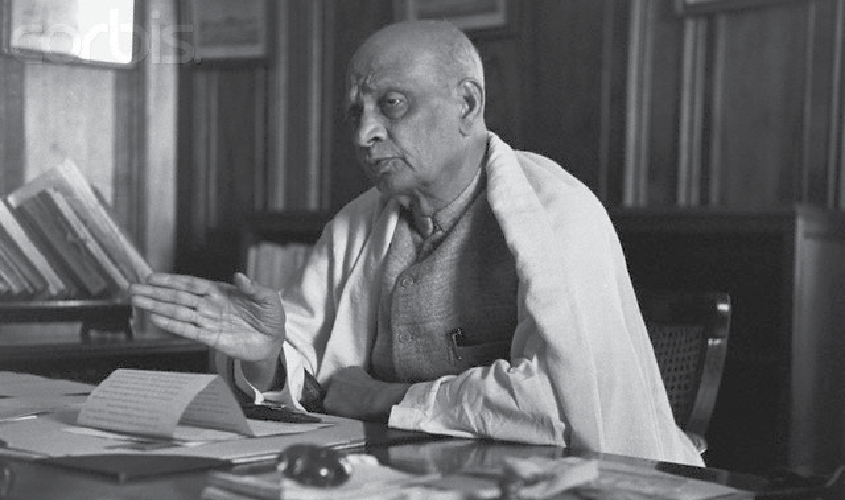Patel told Madhok, ‘I can do nothing. Jawaharlal has kept Jammu and Kashmir under his direct charge.’
The fire of radical Islamism, which is burning Kashmir, does not believe in the territorial integrity of a non-Muslim secular country like India. And stoking this inferno are the likes of Saifuddin Soz, who with his irresponsible, nay well calibrated pernicious statements, is openly playing into the hands of the jihadist Pakistan and Pervez Musharraf, the butcher of Kargil. As part of a diabolical plot against India, these fifth columnists are deliberately making false and misleading statements on Kashmir in the name of Sardar Patel, thereby raising doubts about Kashmir’s very accession to India.
To claim that Sardar Patel wanted Jammu and Kashmir to be given away to Pakistan is hogwash. Nothing could be further from truth than this bluff. This would have been strongly refuted by Prof Balraj Madhok, who had personally met both Sardar Patel and Pandit Jawaharlal Nehru in March 1948 to discuss the Kashmir problem and apprise them of the situation there.
Prof Madhok’s autobiographical account of these two meetings with Prime Minister Nehru and Home Minister Sardar Patel is an eye-opener. As founder-secretary of Jammu Praja Parishad, he met Sardar Patel on 8 March 1948, at his residence in New Delhi to voice his concerns about the communal and anti-national policies of Sheikh Abdullah. After hearing him patiently for about half an hour without any reaction or comment, Sardar Patel gave a short reply: “You are trying to convince a convinced man. But I can do nothing. Jawaharlal has kept Jammu and Kashmir under his direct charge. You meet him. I will ask him to give you appointment.”
Disappointed by the reply, he implored that the people of Jammu looked to him for relief and redress. Abdullah was riding roughshod over the interests and aspirations of the people and wider interests of the country as a whole. He must do something about it. Sardar Patel’s firm reply was: “I know your problem. If, and when, the matter is entrusted to me, I will set things right in one month. But just now, I am not in a position to do anything. You meet Jawaharlal and explain the situation to him.”
Prof Madhok met Jawaharlal Nehru in the latter’s South Block office on 10 March. When told that Sheikh Abdullah was concerned only with Kashmir valley and that his policies were harming the interests of not only Jammu and other regions of the state, but also the wider interest of India as a whole, Nehru remarked: “How can he do that?” And added in Hindi, “We have done so much for him. We have saved him and put him in power. I will be surprised if he behaves in the way you are telling. It cannot happen.”
“The contrast between the two leaders was glaring. While Sardar Patel displayed sympathetic understanding of the Kashmir problem, Pt. Nehru’s approach was dismissive”, wrote Prof Madhok who, being the man on the ground, knew Jammu and Kashmir like the back of the palm of his hand. He was the first to demand the state’s re-ogranisation into Jammu, Ladakh and Kashmir valley to meet the socio-economic needs and cultural aspirations of the people.
Born in Askardu on 25 February 1920 and educated in Srinagar and Jammu, Prof Madhok was a key witness and an active player in the Kashmir drama as it unfolded before its accession to India at the time of partition. He was the one on whom Maharaja Hari Singh entrusted the job of defending the state. His meeting with the Maharaja at the Gupkar Palace in the dead of the night of 23 October 1947, where he was briefed about the prevailing situation and asked to defend Srinagar in which over one lakh Hindus lived, till the Indian Army reached there, is a historical fact.
According to Prof Madhok, who had been persistently writing on Kashmir from 1946 to 2016, “knowledge of radical Islam, Pakistan and Kashmiri mindset are essential to understand the Kashmir imbroglio. The issue of Kashmir is an existential problem for Pakistan founded on the two-nation theory. It is, therefore, unthinkable for Pakistan to let the Muslim majority Kashmir Valley remain with India. Being an Islamic State, it is not bound to honour any agreement with a non-Islamic State. In Jihad, which is a state policy of Pakistan against infidel India, it is ‘sabaab’ to kill enemy (non-believer) who is ‘always met and destroyed inside his own territory’.” This is explained by Pakistani Brigadier S.K. Malik in his book, The Quranic Concept of War, which says: “Terror struck into the hearts of the enemies is not only a means, it is an end in itself. Once a condition of terror into the opponent’s heart is obtained, hardly anything is left to be achieved. It is the point where the means and the end meet and merge. Terror is not a means of imposing decisions upon the enemy; it is the decision we wish to ‘impose’ upon him.” This further explains the dismal failure of the unilateral ceasefire during Ramzan.
As regards Kashmiris, with the temporary Article 370 still hanging around, they are given to believe that the fate of Kashmir is yet to be settled. Separatists in the valley and their sympathisers across the political spectrum are fishing in troubled waters. They are also toeing more or less the same line and aiding and abetting the jihadi elements.

